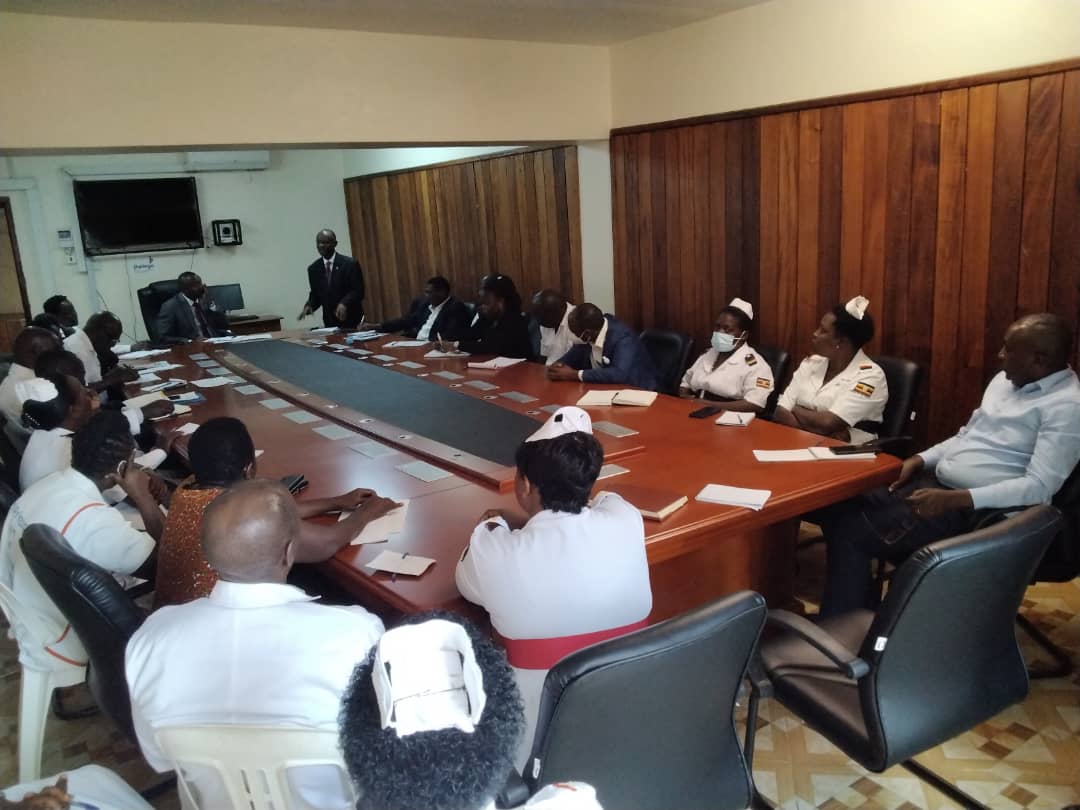
Despite the fact that the government enhanced the salaries of health workers to improve their productivity and efficiency, some complaints of indiscipline, extortion, and absconding from duty are still haunting some health facilities.
Though such acts may not be on a large scale, more often than not, they continue to shape the debate in the court of public opinion on whether pay rise is the magic bullet to improve healthcare service delivery in the country.
Now, the Ministry of Health has stepped up routine supervision among other measures deployed to ensure that every healthcare seeker gets all readily available services in the public facilities.
The Health Ministry’s Director General of Health Services (DGHS) Dr Henry Mwebesa and the team, have been meeting health facility heads and staff in Ankole region to remind them of their core duties and responsibilities.
They first met with the Mbarara Regional Referral Hospital (MRRH) fraternity led by the Acting Director Dr Deus Twesigye. MRRH is a government hospital run by the Ministry of Health mandated to offer comprehensive and super-specialized services, oversee and build the capacity of other health facilities within its catchment area of Ankore region which comprises twelve districts and one city.
“As government, we continue to appreciate health workers for the job well done during COVID-19 pandemic. World over, Uganda was ranked the 3rd in containing Covid-19 and the best on the continent. We also subdued the Ebola outbreak. This didn’t happen by accident, it was through the concerted effort and able leadership”, he says.
Much as Dr Mwebesa acknowledged medics efforts, he is perturbed by cases of extortion and absenteeism from some health facilities which affects service delivery.
“Reports have been showing that since the government increased your paycheck, productivity has not changed. We are always tasked to explain the rationale behind the salary increment yet. You are backstabbing us and the president has been passionate about scientists”, he adds.
Reports of government health workers abandoning their official duties at the expense of running their health facilities or making a living in private hospitals remain the talk of the town.
This, according to the DGHS, is unacceptable as he urged the heads of health services to put in place punitive measures to end the vice.
Dr Deus Twesigye informed the Director General that among other measures, they have installed biometric attendance systems to respond to duty abscondment.
The Ministry’s DG further appealed to health workers to safeguard patients against extortion as he admits that it remains a big challenge in the healthcare system.
At times, due to greed and selfishness, patients are charged for the service supposed to be free of cost in government facilities.
The trend is also blamed on the scarcity of supplies and sundries in the hospitals which compels patients to meet out-of-pocket expenses.
A case in point, at Mbarara Regional Referral Hospital, the ever-increasing population of patients can’t allow National Medical Stores supplies to last for two months.
Dr Twesigye noted that the above challenge can only be dealt with when the hospital is upgraded to a national status. On the other hand, Dr Mwebesa has challenged the media and activists to have what he termed as “balanced critique” while deliberating on issues affecting the healthcare system.
He was reacting to the viral media reports which alleged that a dead baby’s head was eaten by rats at Kawempe National Referral Hospital.
“Yes, if it happens we don’t condone it. But, there are a lot of good things which take place in our hospital. That hospital delivers 120 to 150 mothers of which 25 are C-sections daily than Mulago which delivers 200 babies per month. How much has made it to the front pages”, he wonders.
The outspoken Director General tasked the government hospitals to provide necessary support to their public relations officers in order to take a lead in boosting reputation of the entities and awareness of what takes place in operating theaters and wards.
Vox pops
Sr Judith Kyarisiima, The In-Charge of Maternal and Child Health commended government for increasing their salaries but proposed for continuum learning and training initiative.
“For some patients we refer to Mulago hospital for specialized management, can’t there be a vote for our specialist to accompany the patient and be part of the operating team? This will build our capacity to conduct more extensive surgeries”, she suggests.
Prof. David Kitya, Head of Neurosurgery Department asked the Ministry of Health to urgently address the issue of staff shortage at MRRH. He also lobbied for the image intensifier to give them decisive guidance in the due course of conducting spine and other operations.
Dr Francis Mugabi, Consultant Public Health pointed out limited support in areas of surveillance especially during the outbreaks in the region.
About the Author
Halson Kagure is the Public Relations Officer, Mbarara Regional Referral Hospital, a government hospital and teaching affiliate of Mbarara University & other medical institutions.






